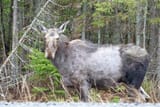>>16722901 (OP)
https://www.mlive.com/news/2025/06/not-your-average-creepy-crawly-parasite-winter-ticks-kill-michigans-moose.html
Not your average ‘creepy-crawly:’ Winter ticks kill Michigan’s moose
Updated: Jun. 11, 2025, 12:33 p.m.|Published: Jun. 11, 2025, 11:54 a.m.
Winter ticks impact Michigan's moose herd
A GPS-collared bull moose shows 25-30% hair loss in this photo. The hair loss is a visible sign of winter tick infestation, which can impact moose health and survival. TheMichigan DNR
By Justine Lofton | jlofton@mlive.com
This tiny parasite can cause moose deaths.
Michigan’s most in-depth study to date into why the moose population in Michigan’s Upper Peninsula is stagnant is looking at several factors that could be impacting mortality, including winter ticks, according to the Michigan Department of Natural Resources, which provided an update today.
“Disclaimer: We’re diving into the creepy-crawly world of ticks,” the DNR said on Facebook. “Side effects may include phantom itching, involuntary shudders, and saying ‘ew’ out loud. You’ve been warned.”
The post was in response to questions about the impact of winter ticks on the moose population after officials provided an update on the study in May. That report included the births of nine calves and the deaths of two.
The study began in February when 20 moose were fitted with GPS collars.
Winter ticks are “not your average tick,” and “may be one of several potential factors impacting health and survival of Michigan’s moose herd,” the DNR said.
The small parasite can cause big problems for moose, sometimes leading to their deaths.
In March, researchers flew thermal sensing drones and captured aerial images of collared moose. They were looking for signs of winter tick infestation. Some of the moose photographed had lost 25-30% of their coats due to intensely grooming themselves due to the itching triggered by the tick infestations.












